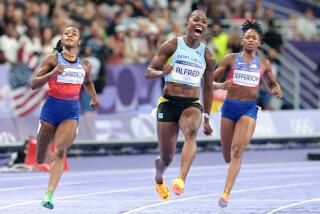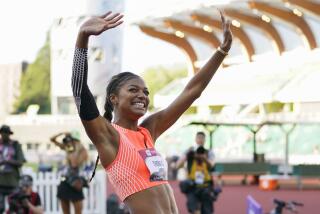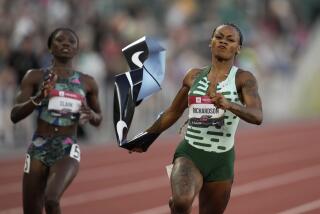Edwards leaves the past behind with title in 100
- Share via
INDIANAPOLIS — Torri Edwards is determined not to look back or rehash the agonizing 18 months following the positive drug test that sidelined her at what seemed to be the height of her career.
Now she no longer has to.
Edwards outran both her past and her opposition with such conviction Friday night at the U.S. Track and Field Championships that she allowed herself an uncharacteristic moment of celebration.
“I was overjoyed, and it just came out,” Edwards said.
She raised her right arm in triumph a split-second before crossing the finish line in the 100 meters, then threw both arms in the air after winning a national title for the first time since serving the doping ban that kept her from the 2004 Athens Olympics.
“That celebration was an appreciation of her long past and finally putting it behind her,” said her coach, John Smith. “That’s the beauty of it. Now we can go forward.”
With a time of 11.02 seconds into a 2-mph headwind, Edwards easily beat reigning world champion Lauryn Williams (11.16), Carmelita Jeter (11.17) and 200-meter world champion Allyson Felix (11.25). All four will run the event for the U.S. at August’s World Championships in Japan.
“I’m definitely back to where I was and maybe even better,” Edwards said.
In the men’s 100, Tyson Gay could have begun celebrating 40 meters from the finish. In 9.84 seconds, Gay won his second straight U.S. title by .23 seconds, the largest margin in the event at nationals since fully automatic timing was first used in 1975. Only Olympic champion Maurice Greene ever has run faster into the wind (9.82), and that was less than half the 1.1 mph breeze Gay faced.
Edwards must feel the wind now is always at her back after running into trouble because she tested positive for the banned stimulant nikethamide in a doping control at an April 2004 meet in Martinique. The stimulant was contained in what she thought was simply a glucose pill.
It kept her out of competition for nearly two years. It made her one of the pariahs in a sport full of them in the months after the BALCO doping scandal emerged to cast a shadow over everyone in track and field.
“I’m definitely looking forward to the next three years, the next two world championships and Olympics,” Edwards said. “I’m going to go out there and get the medals I left behind.”
Ironically, Edwards had become 2003 world champion in the 100 when the winner, countrywoman Kelli White, tested positive for a stimulant and later confessed to following an extensive doping program provided by BALCO. No sooner had she officially inherited the title than Edwards faced the further irony of being caught for doping with a similar substance.
Edwards’ problem seemed worse than it was because of the timing. Her positive test hit the media in the midst of the 2004 Olympic trials, and news that two other members of her club team had tested positive for steroids broke in the next two days. She was in Athens, hoping for a reprieve, when the Court of Arbitration for Sport ruled she had not intentionally cheated but her ban must stand because of rules that say an athlete has strict liability for substances in the body.
“Just not being able to compete in the Olympics was the worst of it,” Edwards said.
The ban eventually was shortened when nikethamide was reclassified by the World Anti-Doping Agency, which made the penalty for its use a maximum of a year to a minimum of a public warning.
Edwards, 30, of Ontario, never stopped coming to the track in the months before she was reinstated in November 2005, but there were days when she could do little but show up.
“There were times when we cried when we walked out to the track, and that was the workout,” Smith said.
Edwards knows there is no way to erase the doping suspension from her biography. She also feels no hesitation to remind everyone it was an extremely harsh punishment for a minor offense.
“It’s been explained over and over again,” she said. “Now I’m focused on the future.”
--
Philip Hersh covers Olympic sports for The Times and the Chicago Tribune.
More to Read
Go beyond the scoreboard
Get the latest on L.A.'s teams in the daily Sports Report newsletter.
You may occasionally receive promotional content from the Los Angeles Times.






